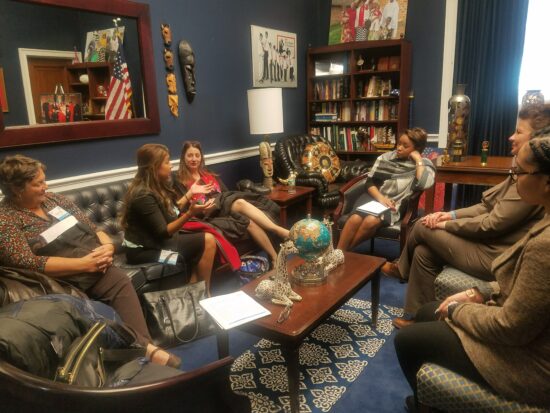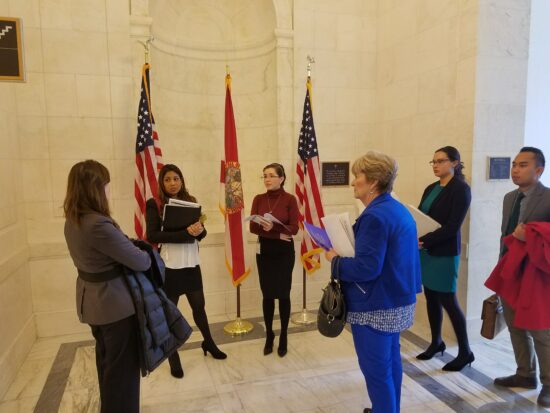By Athena Passera, Ph.D., Board President, Global Ties Miami

Global Ties Miami meets with Cheyenne Range (center), Special Assistant to Representative Frederica Wilson. Photo provided by Annette Alvarez
Advocating for federal support for international exchange programs with our congressional representatives can feel intimidating, but this daunting feeling is unfounded. In fact, as Community-Based Members, we are the voice for a network of community leaders who show they value international exchange programs by donating their time to share professional expertise or host a dinner with international visitors. Given CBMs’ unique position to highlighting the local impact of international exchanges to our elected officials, we hope this article will help others incorporate community voices into their advocacy efforts.
The most direct way in which we involve our local community in advocacy work is through our board members, many of whom have been either a local resource or home hospitality host. Our board has advocacy sub-committees, which meet separately to write letters, coordinate phone meetings, and brainstorm different approaches to garnering the attention of our most influential congressional representatives. We have found that these sub-committees make advocacy work more digestible and is a great way to involve our board members.
Annette Alvarez, our Executive Director, always invites board members to Washington, DC, for the National Meeting or involves them in other local advocacy opportunities. At advocacy meetings, our board members discuss first-hand accounts of their meetings and experiences with international visitors—a powerful tool to highlight the community impact.
No matter who is involved, in preparing for and holding advocacy meetings, the Global Ties Miami approach is to:
- Explain WHAT we do: If the staffer or representative is not familiar with the IVLP or other exchange programs, we like to begin with the IVLP factsheet provided by Global Ties U.S. We then give examples and tell a story or two about an impactful exchange that happened in the last year. If a board member is present, we’ll have them talk about their experience. This is also a good time to bring in our IVLP story handout—a one-pager that tell the story of a visitor and the impact their experience in our community had on them.
- Demonstrate WHY our congressional representatives should care: We begin with the national perspective, using guidance from Global Ties U.S. handouts on the impact that exchanges have on national security, economic interests, and global perception of the United States. We then move to the local impact and perspective, using Global Ties U.S. local impact handouts to highlight the local economic impact, the impact on local vendors, and community volunteer involvement. Additionally, we also conduct an impact assessment report on our local community impact and present the most important takeaways to our elected officials. Developing a full report is not always necessary, but using direct quotes or video messages from resources to highlight community impact will resonate with your Congress members. For example, a quote from our recent report: “Very informative meeting between editors and reporters at the Herald who are covering Zika and the team of public health professionals from Nigeria. Both learned a lot about how to work together in getting information out to the public when there is a health crisis.”
- Highlight WHO else in the community cares: We spend time showing a list of resources and highlighting the breadth of support we get from our community for these exchange programs.
- Have a clear ASK: Our Ask is based on guidance from Global Ties U.S.— usually a request for certain funding levels and timely passing of the budget. We also often ask if they would be willing to talk to their colleagues in other offices to let them know of the importance of international exchange programs and offer to email them copies of the handouts so that they can easily share with their peers.
- Be MEMORABLE: We always try to have elements that will make the meeting memorable, from our leave-behind handouts to attention-catching opening lines. This is one of our favorite openers: “Did you know there is a federally-funded program that your constituents actually choose to donate their time and knowledge to because they believe in the value of it? Can you think of many other federally funded programs that can make that claim? Private citizens, who are often leaders in business and civil society, actively participate in making the IVLP program a success and this is one of the reasons we are thrilled to bring it to your attention and chat with you more about it today.

Florida CBMs advocate for exchanges with a member Senator Marco Rubio’s staff. Photo provided by Annette Alvarez
Of course, the order in which execute the items above and frame our message depends on the staffer’s level of knowledge or interest in discussing the IVLP and other exchange programs. When time is short and we have jump to the “Ask” as quickly as possible, we have found that one-pagers and other leave-behinds on our community of resources and supporters help staffers and Congress members understand what we do and prolong our message beyond the in-person conversation.
Our advocacy approach is constantly evolving. For example, this year we plan to include a new advocacy expectation in our welcome email to all new Global Ties Miami members, advising them that we may ask them to join our advocacy efforts by signing on to a letter, sending an email to their representative, or speaking out about why they support Global Ties Miami and international exchange programs.
